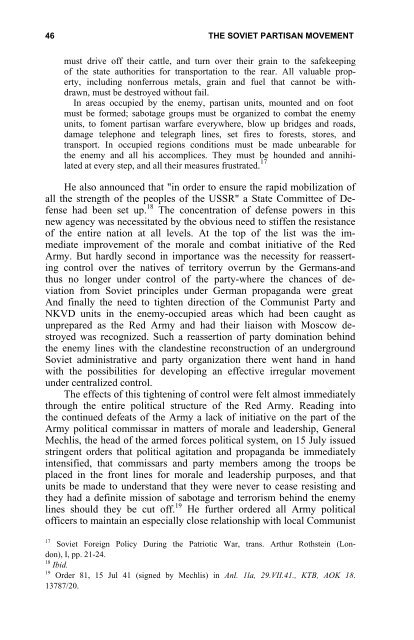the soviet partisan movement 1941-1944 by edgar m. howell
the soviet partisan movement 1941-1944 by edgar m. howell
the soviet partisan movement 1941-1944 by edgar m. howell
You also want an ePaper? Increase the reach of your titles
YUMPU automatically turns print PDFs into web optimized ePapers that Google loves.
46 THE SOVIET PARTISAN MOVEMENT<br />
must drive off <strong>the</strong>ir cattle, and turn over <strong>the</strong>ir grain to <strong>the</strong> safekeeping<br />
of <strong>the</strong> state authorities for transportation to <strong>the</strong> rear. All valuable property,<br />
including nonferrous metals, grain and fuel that cannot be withdrawn,<br />
must be destroyed without fail.<br />
In areas occupied <strong>by</strong> <strong>the</strong> enemy, <strong>partisan</strong> units, mounted and on foot<br />
must be formed; sabotage groups must be organized to combat <strong>the</strong> enemy<br />
units, to foment <strong>partisan</strong> warfare everywhere, blow up bridges and roads,<br />
damage telephone and telegraph lines, set fires to forests, stores, and<br />
transport. In occupied regions conditions must be made unbearable for<br />
<strong>the</strong> enemy and all his accomplices. They must be hounded and annihilated<br />
at every step, and all <strong>the</strong>ir measures frustrated. 17<br />
He also announced that "in order to ensure <strong>the</strong> rapid mobilization of<br />
all <strong>the</strong> strength of <strong>the</strong> peoples of <strong>the</strong> USSR" a State Committee of Defense<br />
had been set up. 18 The concentration of defense powers in this<br />
new agency was necessitated <strong>by</strong> <strong>the</strong> obvious need to stiffen <strong>the</strong> resistance<br />
of <strong>the</strong> entire nation at all levels. At <strong>the</strong> top of <strong>the</strong> list was <strong>the</strong> immediate<br />
improvement of <strong>the</strong> morale and combat initiative of <strong>the</strong> Red<br />
Army. But hardly second in importance was <strong>the</strong> necessity for reasserting<br />
control over <strong>the</strong> natives of territory overrun <strong>by</strong> <strong>the</strong> Germans-and<br />
thus no longer under control of <strong>the</strong> party-where <strong>the</strong> chances of deviation<br />
from Soviet principles under German propaganda were great<br />
And finally <strong>the</strong> need to tighten direction of <strong>the</strong> Communist Party and<br />
NKVD units in <strong>the</strong> enemy-occupied areas which had been caught as<br />
unprepared as <strong>the</strong> Red Army and had <strong>the</strong>ir liaison with Moscow destroyed<br />
was recognized. Such a reassertion of party domination behind<br />
<strong>the</strong> enemy lines with <strong>the</strong> clandestine reconstruction of an underground<br />
Soviet administrative and party organization <strong>the</strong>re went hand in hand<br />
with <strong>the</strong> possibilities for developing an effective irregular <strong>movement</strong><br />
under centralized control.<br />
The effects of this tightening of control were felt almost immediately<br />
through <strong>the</strong> entire political structure of <strong>the</strong> Red Army. Reading into<br />
<strong>the</strong> continued defeats of <strong>the</strong> Army a lack of initiative on <strong>the</strong> part of <strong>the</strong><br />
Army political commissar in matters of morale and leadership, General<br />
Mechlis, <strong>the</strong> head of <strong>the</strong> armed forces political system, on 15 July issued<br />
stringent orders that political agitation and propaganda be immediately<br />
intensified, that commissars and party members among <strong>the</strong> troops be<br />
placed in <strong>the</strong> front lines for morale and leadership purposes, and that<br />
units be made to understand that <strong>the</strong>y were never to cease resisting and<br />
<strong>the</strong>y had a definite mission of sabotage and terrorism behind <strong>the</strong> enemy<br />
lines should <strong>the</strong>y be cut off. 19 He fur<strong>the</strong>r ordered all Army political<br />
officers to maintain an especially close relationship with local Communist<br />
17<br />
Soviet Foreign Policy During <strong>the</strong> Patriotic War, trans. Arthur Rothstein (London),<br />
I, pp. 21-24.<br />
18<br />
Ibid.<br />
19 Order 81, 15 Jul 41 (signed <strong>by</strong> Mechlis) in Anl. 1la, 29.VII.41., KTB, AOK 18.<br />
13787/20.
















